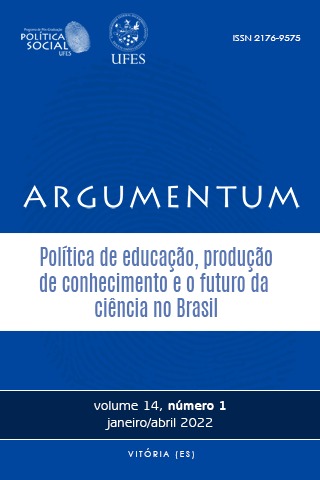Child and adolescent access to mental healthcare: from CAPSi to Health Conferences
DOI:
https://doi.org/10.47456/argumentum.v14i1.35313Abstract
This article analyzes how the perceptions of professionals from Child Psychosocial Care Centers, regarding children’s access to mental health services, affects the guidelines of Health Conferences. Field research was carried out through interviews with a semi-structured script, allied to documentary research and reports from Health Conferences. The findings are discussed based on the concepts of deliberative democracy and communicative action, proposed by Jürgen Habermas. It was observed that the perceptions of professionals are not evident in the reports, as well as evidence of the existence of a barrier of understanding concerning children’s mental health, and that the alterity of children and adolescents may be denied because of the absence of a democratic and deliberative perspective in the development of public policies.
Downloads
Published
Issue
Section
License
Copyright Transfer Agreement
As a condition for submission, the authors must agree with the Copyright Transfer Agreement, by checking the box after reading the clauses.
The author(s) (hereinafter "AUTHOR") hereby agrees to transfer, without any financial compensation, the property of copyrights regarding Argumentum, a journal of the Postgraduate Program in Social Politics (Programa de Pós-graduação em Política Social), Federal University of Espírito Santo (Universidade Federal do Espírito Santo) - Av. Fernando Ferrari, 514 - Goiabeiras 29075-910, Vitória (Brazil), (hereinafter "ARGUMENTUM"), according to the following terms and conditions:
1. I am aware of the terms of "Care Ethics Research Guide" described in the Policies section.
2. AUTHOR warrants to be the writer and copyright holder of the WORK submitted.
3. AUTHOR declares that the WORK does not infringe the rights of third-parties; that the distribution of images (if existent) was authorized; and that AUTHOR assumes total moral and property responsibility for their content.
4. AUTHOR agrees to transfer all the copyrights concerning the WORK to ARGUMENTUM, especially the rights to edit, publish, translate into another language, and reproduce it through any process or technique. ARGUMENTUM becomes the exclusive owner of the rights regarding the WORK, and any total or partial reproduction, in any other medium, printed or electronic, is strictly forbidden without prior written consent by ARGUMENTUM.
5. The copyright transfer is unpaid and, therefore, there will be no monetary compensation whatsoever by ARGUMENTUM in order to use the TEXT.

